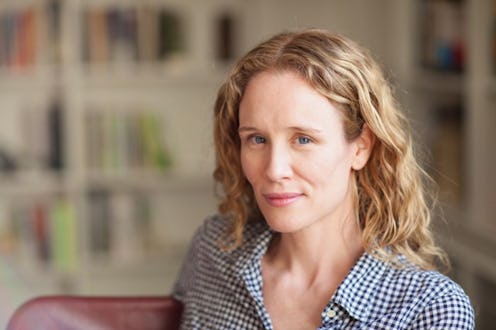Books
Q&A: 5 Questions With Author Elliott Holt

In You Are One of Them (The Penguin Press), author Elliott Holt creates two stunning portraits: one of 1980s Washington, D.C., the other of 1990s Moscow. Both environments are politically-charged and rife with paranoia and secrets, and the ideal landscapes for Holt to let her narrative run wild. Although the author has already snagged plenty of accolades for her pitch-perfect fiction, You Are One of Them is her debut novel. She told Bustle a little about the book's origins, and why releasing this work is a totally different beast.
BUSTLE: Many of the settings and characters’ experiences in the book are close to your own: You worked in advertising and lived in DC and Moscow, for instance. What’s your methodology for parsing what you’ll use from your own life in fiction?
ELLIOTT HOLT: I use what serves the story. Details I know well help animate scenes and give them texture. And I use my emotional experience to bring characters to life. I've never lost a sister, for example, but I am very familiar with grief, so I used my own grief to make Sarah Zuckerman's grief vivid. All fiction writing is somewhat autobiographical, in the sense that a writer's particular worldview can't help but inform her work, but I don't use events from my life. I invent events and then use familiar settings to make those fabricated events feel true.
Tell us a little about your own closest childhood friendship.
My friend KC and I met when she was born and I was two months old. (Our mothers became friends when they were pregnant with us.) KC lived up the street from me in Washington and we went to the same school from age four to 18. For years, our families rented adjoining beach houses in North Carolina every August. So we spent a lot of time together. She had an older brother and I had two younger sisters, but we were so close that we were almost like siblings. In her parents' kitchen, you can still see marks on the wall measuring me–as well as her brother and her–over the years. We're still friends. I just stayed with her and her husband and kids in Minneapolis last week. She reminded me that I'm the one that told her about the birds and the bees when we were five. I don't remember this, but apparently I told her how babies are made. I love talking to her about our childhoods because I've known her even longer than I've known my sisters!
When you were growing up, did you have any grandiose notions of impacting or changing the world?
I always wanted to be a writer. I think writers can change a reader's world (there are certainly writers that changed mine) but I never had any other dreams.
Identity is a pervasive theme in the novel for Sarah, and as a question that hangs over her experiences. Living abroad, did you struggle with any issues of identity or belonging?
I've always felt like an outsider in various ways, even when I wasn't on foreign soil. I was a very sensitive child and I got teased a lot by mean girls and boys in junior high. I was also a very shy kid. I'm much more socially confident now, but inside I still feel like I don't belong to the cool kids' club.
You’ve hit a lot of high notes in your career–fellowships, prizes, and had publications in very esteemed journals–but this is your first book. What’s been markedly different about actually pushing a novel out into the world?
It's like giving birth. (I don't have children, but this book is my baby.) A lot of work went into it and I actually cried the first time I held the hard cover in my hands. Now I'm back to work on another one.